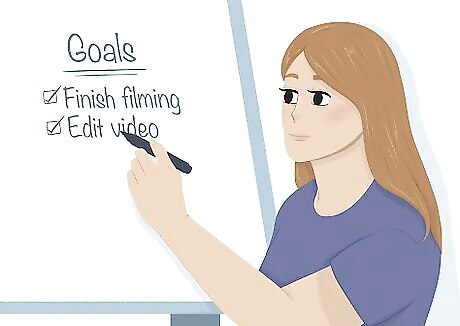
views
Affirm yourself through positive self-talk.

Tell yourself that you're going to do great. Positive affirmations help improve self-confidence and reduce your anxiety. Research shows that focusing on a positive outcome helps you produce that positive outcome. Here are some things you might say to yourself: "This is an opportunity for me to try something new." "It took guts for me to do this and I'm proud of my effort." "I am up for any task that comes my way." "I am grateful for the opportunities that have come my way."
Think about things you're good at.

Focus on your strengths instead of your weaknesses. This helps if your mental pattern is to dwell on all the things that you're bad at or on all of the times you've failed. Instead of thinking about those things, turn on the light in your mind and look at all the things you've achieved and the things you can do. Whenever you find yourself turning to a weakness or a negative, gently turn your mind towards a strength or a positive. For example, if you're nervous about a presentation but you know you're great at making presentation slides, you might think, "My presentation might not go great, but that's okay! I know people will love the slides and easily be able to follow along regardless." This might be hard to do at first, but the more you do it, the more natural it will become. After a while, you'll find you can do it without even having to consciously think about it.
Be kind to yourself.

Treat yourself like you would your best friend. If you're about to say something critical to yourself, stop. Ask yourself, "Is this something I would say to my best friend?" If your answer is "no," then you shouldn't say it to yourself either! Encourage yourself and lift yourself up rather than being overly critical or demanding of yourself. Remember that nobody is perfect—including you. If you expect perfection from yourself, you'll always find something to criticize yourself over. Focus on the effort you put into things rather than the outcome. For example, you might say, "I didn't get the position I wanted, but I had a really good interview and I learned more about what I want out of work. Now I have the opportunity to pursue something else."
Express love for yourself.

Give yourself unconditional respect and love. When you love yourself, you treat yourself like the hero of your own story. Remember that you have grown and developed into an amazing human being who you appreciate. One way to do this is to take 10 deep breaths in and out slowly. As you breathe, focus on nothing but love for yourself as a whole person. It could be as simple as saying, "I love myself" in your mind. When things happen in your life, nothing can take away the love that you feel for yourself. With practice, this will become a natural state for you.
Repeat a motivational mantra.

Create a motivational mantra that pumps you up. It's pretty easy to come up with a great mantra for yourself. Just think about what you want or how you want to be perceived, then add the words "I am" in front of it. Here are some examples: "I am enough." "I am at peace in this moment." "I am worthy of taking up space." "I am strong."
Visualize yourself succeeding.

See yourself doing well and focus on how it feels. Sit back, close your eyes, and imagine yourself achieving your goal. Try to put as much life as possible into the details. Who's there with you? What's going on around you? What does it feel like? What are you thinking? The more details you can create, the more real it will seem. When you can picture yourself there, you're more likely to actually achieve your goal. You've made success real in your mind—now all you have to do is make it a physical reality. Don't just visualize the success itself—walk yourself through all the things that need to happen to achieve your goal.
Spend time with people who give you a boost.

Build positive, fulfilling relationships that help you feel good. Try to limit your time with people who are overly critical or only bring you down. After a while, you'll start to internalize the things they say. Instead, surround yourself with people who have a generally positive outlook on life and look at things with an open mind. If you cultivate curiosity and work on being more open-minded, you'll be less likely to assume that the worst will happen, which can help you build confidence in yourself. When you spend a lot of time with people who are curious and interested in the world around them rather than dismissive and skeptical, that curiosity will rub off on you.
Set realistic goals for yourself.

Achieve a small goal to get an instant confidence boost. When you set a goal, you're making a commitment to yourself that you're going to achieve that thing. Start small! When you make small commitments to yourself and keep them, you'll gradually become more confident in your ability to accomplish what you want to accomplish. For example, you might want to eat more healthy foods. You might start by making a commitment to yourself to cook one healthy meal for yourself each week. When you accomplish that for several weeks in a row, you'll really feel your confidence improving. Not only do you get a confidence boost from doing something that you wanted to do, you also get a confidence boost from the fact that you made a commitment to yourself and then respected yourself enough to keep that commitment.
Face your fears head-on.

Stand up to things that cause you anxiety. If there's something you're afraid of, take a deep breath and do it! You might need to start small, but as you gradually overcome your fears, you'll start to believe in yourself more and more. You conquered something that previously scared you—that's a big deal! For example, if there's someone in a group you're in who you find intimidating, take a minute next time you're there to walk up and say "hi" and introduce yourself. When you face your fears, you not only improve your self-confidence but also your self-esteem, which could be defined as the reputation you have with yourself. These two concepts are interrelated because when your reputation with yourself is strong, you're more likely to have faith in yourself.
Breathe deeply to calm your nerves.

Use a deep breathing exercise to relax and focus. When you breathe deeply and focus on your breath, it helps you center yourself and keep anxiety at bay. Try this: take a deep breath in for 4 counts, breathe out for 4 counts, and then hold it at the bottom for 4 counts. Repeat this cycle 4 times. Doing deep breathing will help you feel more relaxed and centered. Deep breathing exercises also help bring your attention to the present moment. A lot of self-doubt comes from thinking about the future. If you stay in the present, you'll feel more confident.
Stop procrastinating on small tasks.

Accomplish something so that you feel that burst of confidence. People often procrastinate because they're afraid to fail. If you can get something small out of the way that you've been putting off for a while, you'll get an instant confidence boost when you achieve it. Then, celebrate your achievement—no matter how small. It's important to avoid slipping into negative self-talk here. If the task turned out to be super easy, you might wonder why you put it off for so long. Just say to yourself, "I'm glad that I accomplished that today. I did a great job with it and now I no longer have it hanging over my head."
Groom yourself and dress nicely.

Put extra effort into your appearance for a quick confidence boost. Just the act of spending a little time on your appearance can give you a bit of a confidence boost. Looking at yourself in the mirror and actually being proud of what you see will really build up your self-confidence in a good way. Stand tall and smile at yourself in the mirror and tell yourself you look great. Listen to confidence-building music while you're getting ready to enhance the whole moment and make your boost even stronger.
Smile broadly and project happiness.

Look happy to see the world around you. Just moving the muscles of your face into a smile helps your brain process the world around you in a more positive way. So by pretending to be happy and comfortable, you can actually help make yourself more happy and comfortable. Smiling also projects confidence to those around you. When you smile, you seem more open and welcoming. You'll seem like you belong and are comfortable being there.
Sit or stand with good posture.

Straighten your back and open your shoulders for a quick boost. When you sit or stand with confidence, people around you believe you're confident (even if you're really not). This might seem a little like "fake it until you make it," but it really works. When you stand tall and proud with your chest out, you take up more space and feel more confident about yourself. In contrast, if you're slouching or hunched over, you might give people the impression that you're not interested in what's going on or don't want to be there.
Get up and move around.

Try some short, light exercise or an activity to get your blood pumping. A little physical activity stimulates your body to produce some feel-good hormones that will really lift your mood. Beyond that, it helps release nervous jitters and can make you feel a lot more confident in yourself. For example, you might do some quick jumping jacks or push-ups before you have to give a presentation that you're nervous about. A short, brisk walk can also help you clear your mind and feel more confident about whatever situation you're about to face.
Talk to a friend, family member, or coworker.

Ask someone you're close to for a pep talk. Sometimes it's hard to admit that you're nervous or afraid about something, but your friends and family are always there to help. Let them know what's got you down and ask if they'd be willing to say something to boost your confidence a bit and help you feel better about it. For example, you might say, "Hey, I've got this date coming up. I really like this person and I'm feeling pretty nervous about it. Could you tell me some things you like about me to pep me up a little?"




















Comments
0 comment